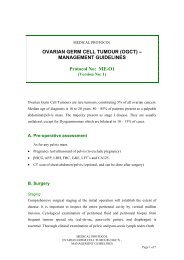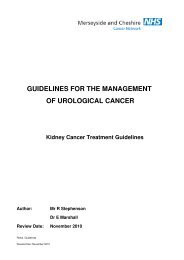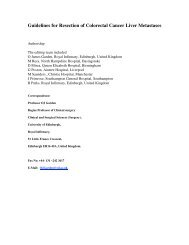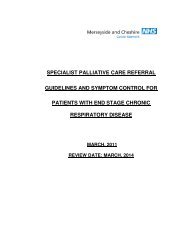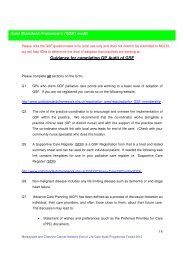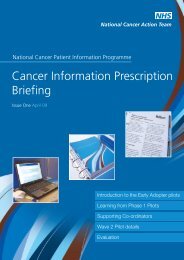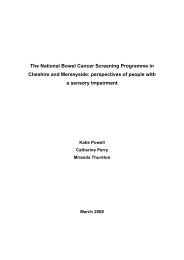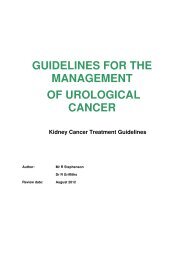Cancer Reform Strategy - NHS Cancer Screening Programmes
Cancer Reform Strategy - NHS Cancer Screening Programmes
Cancer Reform Strategy - NHS Cancer Screening Programmes
- No tags were found...
Create successful ePaper yourself
Turn your PDF publications into a flip-book with our unique Google optimized e-Paper software.
CHAPTER 3: DIAGNOSING CANCER EARLIER 49the evidence develops, working closely with theUK National <strong>Screening</strong> Committee.<strong>Screening</strong> for lung cancer3.36 There is an increasing weight of evidencein support of introducing a trial for thescreening of lung cancer. The Department ofHealth is leading work on behalf of the National<strong>Cancer</strong> Research Institute (NCRI) to commissionresearch on the feasibility of a UK trial of CTscreening for lung cancer. The National Institutefor Health Research (NIHR) Health TechnologyAssessment programme has issued acommissioning brief, taking full account of thetrials already underway in the US and Europe,with a view to funding feasibility studies as soonas possible. If there is progression to anexploratory trial and then a full randomisedcontrolled trial, these will take a number ofyears to complete and will require consortiumfunding which will be brokered through NCRI.<strong>Screening</strong> for prostate cancer3.37 There is currently insufficient evidence toshow that screening based on existingtechnology would reduce deaths from prostatecancer. The efficacy of the Prostate SpecificAntigen (PSA) test for the screening or earlydiagnosis of prostate cancer remainscontroversial. Many cancers detected initiallythrough the PSA test would have caused noproblems during a man’s natural life span.In addition, there is no consensus amongstclinicians on the best form of treatment forlocalised prostate cancer, be that surgery,radiotherapy or active monitoring. TheDepartment of Health through its NIHR HealthTechnology Assessment programme is funding atrial of surgery versus radiotherapy versus activemonitoring for PSA-detected localised prostatecancer at a cost of over £30m (the ProtecT trial).Associated research in partnership with <strong>Cancer</strong>Research UK is examining the impact of PSAtesting. Results from major trials are expected inthe next three to five years and the UK National<strong>Screening</strong> Committee keep prostate cancerscreening closely under review.3.38 The Prostate <strong>Cancer</strong> Risk ManagementProgramme (PCRMP) was introduced in 2002 tohelp GPs and practice nurses in advising menwithout symptoms of prostate cancer on theimplications of having a PSA test. This empowersmen to make an informed choice on whether ornot to have a test based on their own lifestylesand values. An evaluation of the PCRMP wasfunded by the Department of Health to helpinform the future direction of the programmeand the PCRMP pack is currently being reviewed.A consultation will be published in the spring,with the intention of launching the revisedPCRMP packs in the summer of 2008. Thereview will take full account of the results of theProstate <strong>Cancer</strong> in Ethnic Subgroups (PROCESS)study 22 , which showed that black men are threetimes more likely to develop prostate cancercompared to white men.3.39 The Department of Health is supportingthe development of screening technology forprostate cancer by having a comprehensiveresearch strategy into all aspects of prostatecancer. We are jointly with other National<strong>Cancer</strong> Research Institute (NCRI) membersfunding two NCRI Prostate <strong>Cancer</strong> ResearchCollaboratives and the Department of Healthfunded half of the original cost of £7.4 million.Following a review of progress by aninternational expert panel the Department ofHealth, <strong>Cancer</strong> Research UK and the MedicalResearch Council have agreed to provide afurther three years funding of £3.9 million.<strong>Screening</strong> for ovarian cancer3.40 In ovarian cancer, the Medical ResearchCouncil, <strong>Cancer</strong> Research UK and theDepartment of Health are funding the UKCollaborative Trial of Ovarian <strong>Cancer</strong> <strong>Screening</strong>(UKCTOCS), which began in 2000 and involves200,000 post-menopausal women aged 50 to74 across twelve UK centres. The trial isassessing the effectiveness of two possiblemethods of ovarian cancer screening, an annualCA125 test (a blood test for a cancer antigen)and an annual trans-vaginal ultrasound. Fullresults are not expected before 2012.New developments in screening3.41 Working with the UK National <strong>Screening</strong>Committee, we will continue to monitor andassess research evidence for the effectiveness ofscreening for these and other cancers such as



